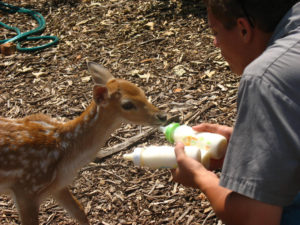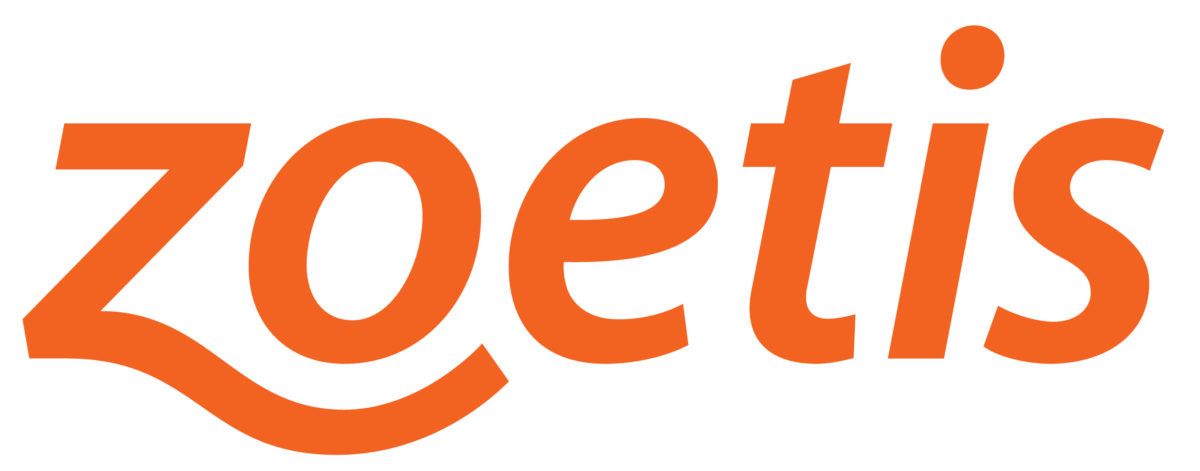Johne’s disease can be controlled in cervid herds. Find the infection as soon as possible, keep good records, and make sure the deer fawns or elk calves kids have no chance to swallow MAP-contaminated milk, colostrum, hay or water.
Control is easy, it just takes time.
Overview
Johne’s disease can be controlled and even completely eliminated (some in New Zealand may disagree) from infected cervid herds. However, it takes a thorough understanding of the disease by animal owners, consultation with a veterinarian, and requires use of one or more of the available goat diagnostic tests. Half-hearted attempts to control Johne’s disease will generally fail. Control of Johne’s disease also takes time and a strong commitment to management practices focused on keeping young animals away from contaminated manure, milk, water, etc. A typical herd clean-up program may take a number of years. Faster clean-up programs are possible, but they are usually more expensive.
The basics of control are simple: 1) new infections must be prevented, and 2) animals with the infection must be identified and removed from the herd.
#1 Prevent new infections in deer fawns or elk calves
Manure management
The most MAP bacteria excreted by infected deer or elk are in the feces (manure). Farm sanitation and control over where manure goes on a farm are critical to control of Johne’s disease. Because of the susceptibility of kids to MAP infection, it is important to keep them well away from goat pellets that may harbor the infection at least for the first 6 months of life, the “window” of maximum susceptibility.

Neonates should be born in a clean dry environment with minimal fecal contamination. Individual maternity pens are optimal but if not feasible, you may establish test-negative and test-positive pens. To do this, you would test all your adult females a few months prior to birthing season to have this test information available at the right time. Then try to establish an area outside the pen free of adult manure contamination (“the safe zone”) for neonates born to test-negative does.
Manure contamination of water supplies, particularly ponds or streams that youngsters can drink from, must be avoided to limit spread of the infection. If you use water troughs, when cleaning them remove the sediment at the bottom and dump it away from where animals might graze – MAP apparently survives for a long time in this wet goo.
Pasture contamination with MAP is also important as a means of infection transmission, but it is less important than other modes of transmission and far more difficult to control. For the very concerned, you can till contaminated pastures and wait for time and environmental conditions (repeated changes in temperature, minimize shaded soil by cutting grass/crops/shrubs) to kill off MAP on fields. While a majority of the organisms die within three months, a small population can remain for up to a year. Put off stocking contaminated pasture with young animals as long as feasible.
Read about survival of MAP in the environment in the “Biology of MAP” section of this site.
Milk and colostrum management
Many animals infected with MAP will excrete the bacterium in their milk. This happens most often in does showing clinical signs of Johne’s disease, but also occurs in MAP-infected animals that appear healthy.

Colostrum, the antibody-rich milk produced by goats in the first few days after giving birth, also can contain MAP. Because colostrum is critical to the health and survival of newborns, feeding colostrum must be done. However, the risk of transmitting MAP infections in colostrum can be minimized by following these three simple rules:
- Use colostrum from Johne’s test-negative animals only.
- Do not pool colostrum from multiple animals.
- Thoroughly wash and dry the udder and teats before collection of aseptic collection of colostrum into clean containers.
Pasteurization of colostrum is technically a fourth alternative. However, the thick viscous nature of colostrum makes it very difficult to pasteurize and so for practical reasons it is not advised.
#2 Identify and remove infected adult goats
Test-and-cull program
The majority of MAP infections in a herd are “invisible”. Deer or elk with clinical signs of Johne’s disease (diarrhea and weight loss) are only a small fraction of the infected cervids in a herd. The infection has the ability to silently spread from adults to fawns or kids long before signs of illness in infected animals are evident. For this reason, laboratory tests are important to determine which adults are infected (the source of MAP). Test-positive deer or elks are generally those most likely to be infectious (excreting MAP in milk and manure) and so they should be removed, or at least isolated from, the herd.
Referred to as a test-and-cull program, this practice is essential to successful control of Johne’s disease in herds in a reasonable period of time. Clearly, there are situations where alternatives must be considered: testing and culling of all test-positive animals is not necessarily always required. For instance, some control programs retain animals with low or medium-level ELISA results but these animals must be clearly tagged and strictly managed since they are almost certainly shedding MAP on the premises in their manure as well as in their milk. Farmers report that knowing the Johne’s test status of a adult cervids affects when the animals is culled if she develops any other health problems. Decisions on how best to implement testing in a Johne’s control program should be made in consultation with your veterinarian. For details about available laboratory tests for Johne’s disease, see the diagnosis section of this web site.
Disinfection
MAP is resistant to most disinfectants; washable tools, troughs, and feed dishes may be treated as directed on the bottle with a disinfectant labeled as “tuberculocidal”. Since organic material deactivates the disinfectant, items should thoroughly cleaned with soap and water, rinsed and dried before the disinfectant is applied. Tuberculocidal disinfectants usually contain strong chemical compounds and should be used carefully. The instructions provided on the label for proper use and safe handling should be followed precisely.
Vaccination
No Johne’s disease vaccines are available for goats in the United States. In New Zealand, some European countries and Australia a vaccine (Gudair) is used in cervids and small ruminants and has been found to decrease the frequency of animals that develop clinical Johne’s disease and reduces the amount of shedding of MAP. It does not appear to change the rate that goats get infected.
Considerable research is ongoing to devise better and safer vaccines for Johne’s disease.

